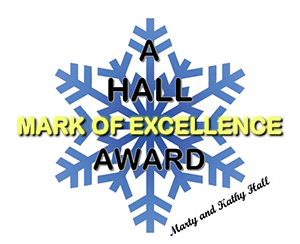 This coverage is made possible through the generous support of Marty and Kathy Hall and A Hall Mark of Excellence Award. To learn more about A Hall Mark of Excellence Award, or to learn how you can support FasterSkier’s coverage, please contact info@fasterskier.com.
This coverage is made possible through the generous support of Marty and Kathy Hall and A Hall Mark of Excellence Award. To learn more about A Hall Mark of Excellence Award, or to learn how you can support FasterSkier’s coverage, please contact info@fasterskier.com.
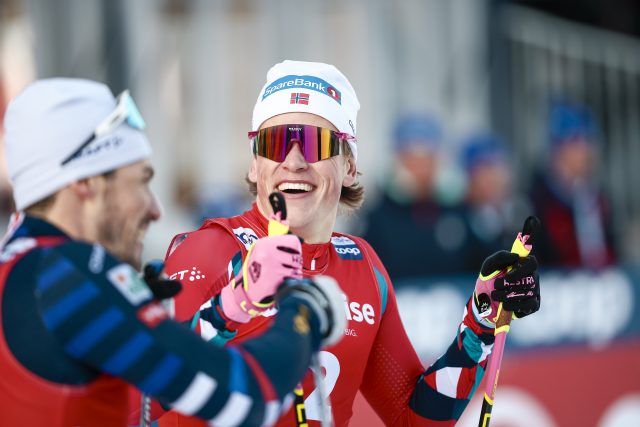
Goms, Switzerland has never hosted a World Cup Sprint competition before, so prior experience would offer no tactical advantages to racers in today’s Freestyle Sprint. The playing field would be level, and everyone would be forced to develop a knowledge of the course—and strategies for taking advantage of its many twists and turns—together.
Not a course that challenges racers with the thinner air of higher elevations (Davos, Switzerland, is 1,000 feet higher), Goms nevertheless offered considerable challenges including an unnaturally long flat section at the beginning, followed by steep climbs and technical descents featuring consequential ruts in soft snow. Compared to other World Cup Sprint courses, Goms also seemed quite short—the top women’s qualifier, Jonna Sundling (SWE) qualified in under three minutes. Though perhaps not quite as long as World Cup competitors are accustomed to, the Goms course succeeded in seriously challenging all who tested it.
“The first uphill here feels forever,” said Johannes Hoesflot Klaebo (NOR) in post-race comments. And many skiers who spent too much energy pushing the pace or scrambling for position on that first hill would find themselves struggling, stumbling, or falling later in the race.
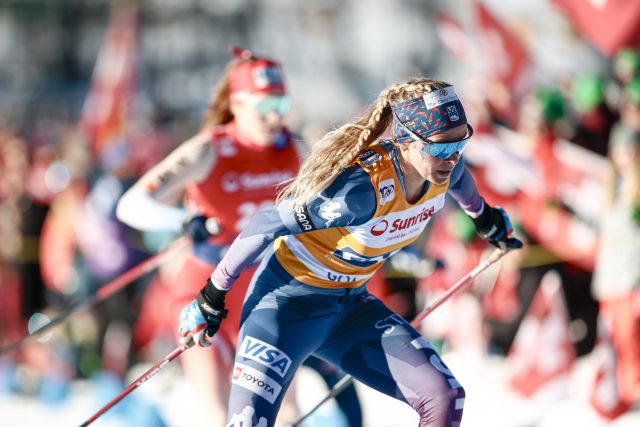
Women’s Freestyle Sprint
The top American women—Rosie Brennan and Jessie Diggins—skipped the last two World Cup relays, choosing to prioritize their standings in the season-long race for the World Cup Crystal Globe. Diggins leads the chase for the overall title, while Brennan continues to hold her position in third (though the race for the podium is definitely tightening). Throughout the season, Diggins has added to her overall lead by earning numerous appearances in Sprint finals, strategically using her endurance to keep all heats fast and punishing. It’s allowed her to advance deep into semifinals and finals, and added points to her tally that other distance skiers have found themselves incapable of matching. In another nod to Diggins strategic prowess, she was able to claim top bonus points in both intermediate sprints in the recent World Cup 20 k Mass Start (on her way to a sixth place finish in the day’s results).
World Cup Sprint leader, Linn Svahn (SWE), entered the Sprint in Goms having won the last three World Cup Sprints in a row. Sweden delivered five of the top six qualifiers (Jonna Sundling, Svann, Emma Ribom, Frida Karlsson, Johannna Hagstroem), a dominant blue and yellow front interrupted only by the presence of Victoria Carl (GER) in fifth.
Diggins finished ninth in qualifying, and dominated her quarterfinal, a heat punctuated by an inadvertent pole-jab to the face of Frida Karlsson (SWE) in the free-skate section of the final downhill. Diggins is well known for her high-velocity freeskate, generating more speed than perhaps any other skier with this technique. Her power is reflected in the high and dynamic manner in which her poles drive behind her. Karlsson seemed to ignore that threat as she pulled up behind Diggins. Karlsson was lucky to have been wearing glasses, or the result could’ve been far more grim.
In her semifinal, Diggins tangled skis with another racer on the final uphill. She would recover quickly, but could not regain the speed that had been lost. She would find herself eliminated, as the Goms course claimed one of the world’s best . . .
“Today in the Sprint I definitely was struggling with the super-quick start, and the tactical nature of how the course was curving,” said Diggins. “I definitely got stuck and boxed-in in the semi, and wasn’t able to push the pace the way I needed to. And then getting tripped and falling was just the icing on the cake! But that happens in sprinting . . . and I was proud of myself for getting up right away and continuing to fight for it.”
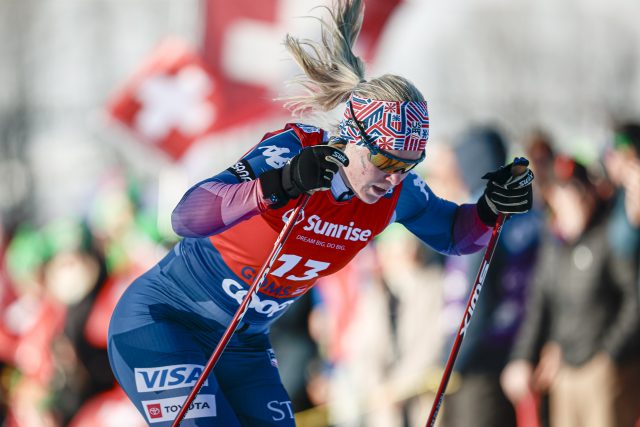
Sammy Smith (USA) delivered her best Sprint qualifier in 13th, but fell in her quarterfinal after having attempted to push the pace at the front. The Goms course claimed another contender . . .
“Today I tried to get out faster and harder,” said Smith. “The trail was really wide as well which definitely helped and made it easier to move up. I will always try to get to the front and drive the pace if possible, but there are definitely a lot more things I need to learn and improve on before I can do that consistently!”
Rosie Brennan qualified 17th, but did not advance beyond her quarterfinal. Among Canadians in qualifying, Lillian Gagnon finished 31st, Olivia Bouffard-Nesbitt 41st, Sonjaa Schmidt 43rd, Katherine Weaver 46th.
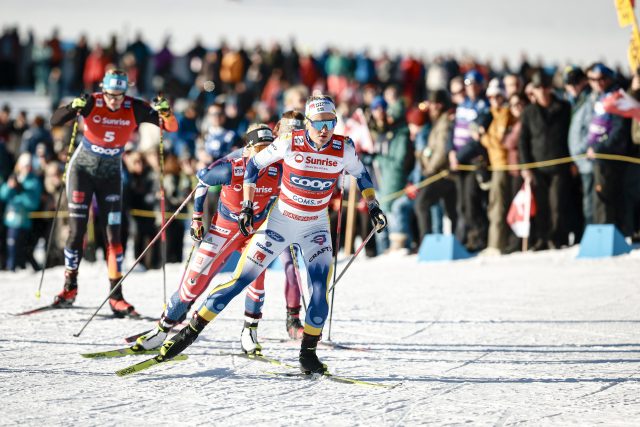
Women’s Final
Shadows covered the course by the time of the Women’s and Men’s finals. Course conditions were likely to have changed, and downhill curves were likely to prove even more daunting. The Women’s final was comprised of five Swedes (Sundling, Svann, Ribom, Karlsson, Hagstroem) and hometown favorite, Nadine Faehndrich (SUI). Faehndrich found herself gapped on the first hill as Team Sweden stormed over the top, led by Svahn. Sundling would prove to be the most adept downhiller, but she stepped on her own pole in the subsequent uphill, and faded from contention. Svahn cruised easily across the line for the win. Sundling would recover to finish third behind Dahlqvist.
Svahn leads the World Cup Sprint standings by 96 points over her teammate, Sundling. Diggins is tied for third with Kristina Stavaas Skistad (who did not compete in Goms this weekend).
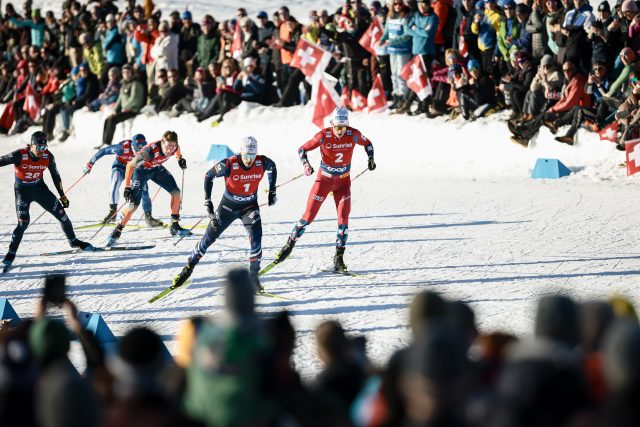
Men’s Freestyle Sprint
World Cup Sprint leader, Erik Valnes (NOR), qualified seventh, while his rival in the World Cup overall title chase, Harald Oestberg Amundsen (NOR), qualified 13th. Though Valnes was passed over in Norwegian team selections for tomorrow’s 20 k Mass Start event, both he and Amundsen will continue contesting the on-going race for the Overall Crystal Globe.
Klaebo finished an uncharacteristic seventh in last week’s Sprint competition in Oberhof, Germany. In a remarkable testament to Klaebo’s longtime Sprint dominance, that seventh place finish marked the first time that Klaebo had failed to make a Sprint final since 2018. After the Oberhof weekend, Klaebo commented that he was feeling better since his absence due to Covid, but he hoped that he would return to his best form in weeks to come. Both Klaebo and Chanavat advanced easily out of quarterfinal 1. Chanavat again made the pace in the semifinal (that he raced alongside Klaebo). Knowing that Chanavat would utilize this strategy (as he has in nearly every heat and final this season) Klaebo seemed content to shadow Chanavat, hiding his own plans and abilities for the head-to-head race with Chanavat that was sure to be contested in the final.
Among American men, Gus Schumacher qualified 23rd, but would be eliminated in his quarterfinal. Kevin Bolger qualified 47th, with Peter Wolter 58th. Canadian finishers in Sprint qualifying included Antoine Cyr 35th, Xavier McKeever 49th, Sasha Mason 51st, Thomas Stephen 61st, Derek Dueling 62nd, Julien Locke 65th.
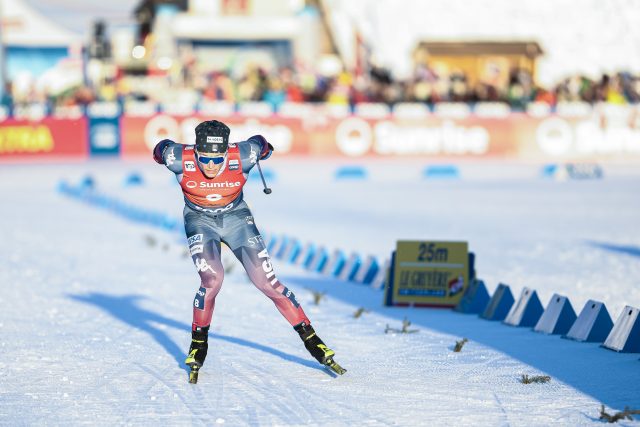
Ben Ogden (USA) qualified a career-best third behind Chanavat and Klaebo. JC Schoonmaker—who qualified seventh—made almost every tactical mistake he could make in his quarterfinal (pinched on inside lines, too soon to the V1 on uphills, pushed to the outside on the final bend), yet still managed to sprint past Johan Haeggstroem to claim the second qualifying spot.
“There was one route around the course that was the fastest,” said Ogden. “If you weren’t in it at any point, you had to use extra energy. But, it is not so consequential. I think if you’re in the wrong lane up the hill or around the corner, I don’t think it makes that much a different but definitely can mentally be a boost to take a bad line and still get through.”
Ogden and Schoonmaker lined up together for the Men’s second semifinal, a closely contested heat that saw considerable bumping and jostling. Richard Jouve forced an inside line in the penultimate righthand turn, subsequently side-swiping Ogden who fell and dropped from contention. Schoonmaker sprinted with Jouve for second. Schoonmaker narrowly lost the race to the line and was eliminated. The technical, tactical Goms course had claimed two more Americans.
“To be close to the final is bittersweet,” said Schoonmaker. “But I also think it’s cool to realize that I’m at a point where getting knocked out on the semis comes with a little disappointment.”
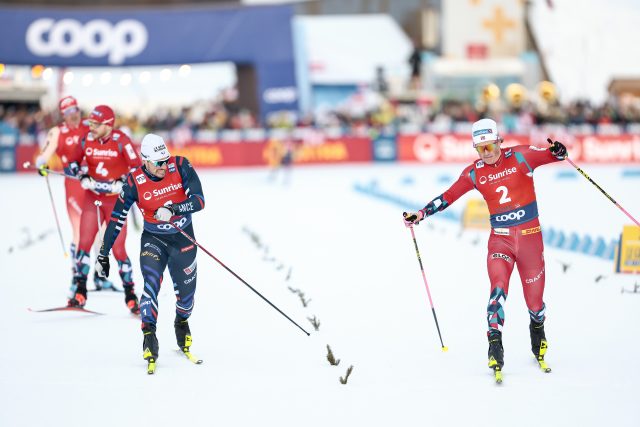
Men’s Final
Three Norwegians (Klaebo, Valnes, Taugboel), two Frenchmen (Chanavat, Jouve), and hometown favorite, Valerio Grond (SUI). As expected, Chanavat led out the pace with Klaebo at his shoulder. Valerio Grond made a strong move up the first hill, tangling briefly with Klaebo before slotting in behind Chanavat. Grond would skid through the next downhill curve, allowing Klaebo to move past on the inside. Chanavat and Klaebo appeared relaxed down the final hill and across the flat before the final turn, neither one seeming to be in any hurry to unleash their finishing sprint. Ultimately, no one can generate more speed than Klaebo, who overtook Chanavat in the closing meters to return to the top of the World Cup Sprint podium. Chanavat crossed a tenth of a second later, followed closely by Taugboel. All day long, Chanavat had done things his way. But, at day’s end, it was Klaebo who restored the status quo, showing that on a World Cup Sprint course, the only true way is Klaebo’s.
“Chanavat was really strong today,” Klaebo said in post-race interviews. “I felt like he was pushing hard the whole day. I’ve been competing against him since the quarterfinal, so now I’m really tired!”
With his victory in the Freestyle Sprint, Klaebo claimed his 73rd win in 107 World Cup starts, an astonishing winning percentage of 68%!
Women’s Freestyle Sprint RESULTS
Men’s Freestyle Sprint RESULTS
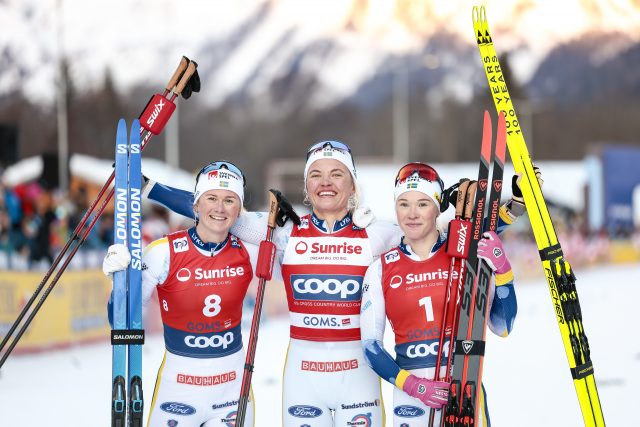
John Teaford
John Teaford—the Managing Editor of FasterSkier — has been the coach of Olympians, World Champions, and World Record Holders in six sports: Nordic skiing, speedskating, road cycling, track cycling, mountain biking, triathlon. In his long career as a writer/filmmaker, he spent many seasons as Director of Warren Miller’s annual feature film, and Producer of adventure documentary films for Discovery, ESPN, Disney, National Geographic, and NBC Sports.



